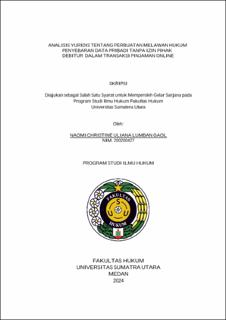| dc.description.abstract | The existence of online loans makes it easier for people to obtain loans
quickly to meet their living needs, but on the other hand, it also has the potential
to harm the parties involved. Currently, many cases occur as a result of these
online loans, one of which is regarding the distribution of personal data of
debtors without permission. The purpose of this study is to determine the
regulations regarding the legal protection of personal data, to determine the legal
consequences of unlawful acts of distributing personal data without the
permission of the debtor in online loan transactions, and to determine the efforts
made by debtors against unlawful acts of distributing personal data of debtors in
online loan transactions.
The method used in writing this thesis is the normative legal research
method, namely a method that refers to legal norms carried out by means of
literature studies in order to obtain secondary data in the form of primary,
secondary, and tertiary legal materials related to the problems studied, this
research has a descriptive nature, and the data is analyzed qualitatively.
The results of the regulation show that personal data protection in
Indonesia is regulated hierarchically starting from the 1945 Constitution Article
28G paragraph (1) which guarantees the right to personal protection as a human
right, followed by Law No. 27 of 2022 concerning Personal Data Protection
(PDP Law) which provides a comprehensive definition of personal data
protection (Article 1 number 1), Law No. 19 of 2016 (ITE Law) Article 26
paragraphs (1) and (2) which regulates the consent to use personal data, and PP
No. 71 of 2019 Article 14 paragraph (1) concerning the obligations of electronic
system organizers. The legal consequences of the distribution of personal data
without permission in online loans can be categorized as an Unlawful Act
according to Article 1365 of the Civil Code and violates Article 27 of the PDP
Law concerning the obligation to process data in a limited, legal, and transparent
manner, with consequences in the form of administrative sanctions (Article 57)
and criminal sanctions (Article 67) in the form of a fine of up to IDR 5 billion or a
maximum imprisonment of 5 years. Legal efforts that can be taken by debtors
based on Articles 51, 60, and 61 of the PDP Law include submitting complaints,
objections, civil lawsuits both individually and as class action representatives to
obtain compensation for the misuse of their personal data. | en_US |


